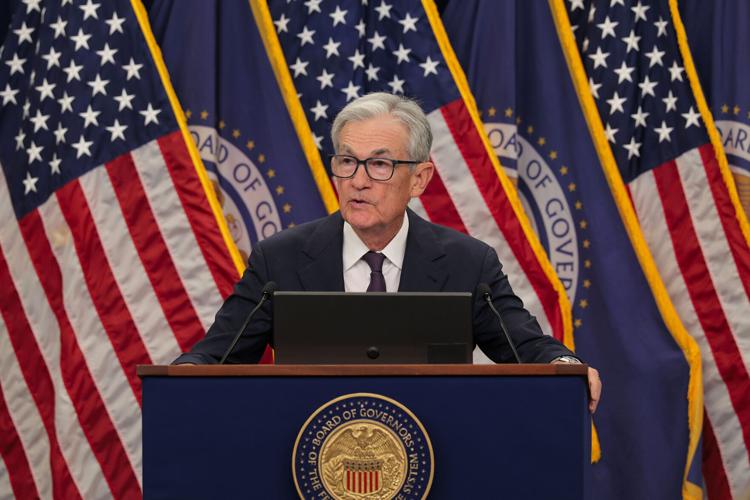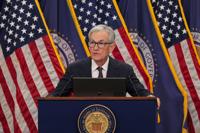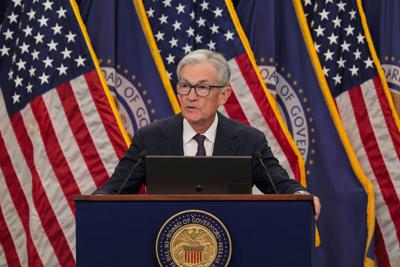The Federal Reserve cut its benchmark lending rate by a quarter point Sept. 17, but Babcock Mortgage had already seen an uptick in calls.
Susan and Bill Egan, co-founders and mortgage brokers with Babcock Mortgage, said the 30-year conventional home loan rate already had been ticking downward in anticipation of the Fed’s announcement this week. Some homeowners, ones who have taken loans within the past three years, are finally looking to refinance again, they said.
“We’ve had 30 more calls this week than we did last week,” Susan Egan said. “Everyone is thinking about it right now. They just have to figure out if it’s the right time — that’s the one thing that’s super important. There’s a lot of volatility. The tariffs play a big role in uncertainty, and the market doesn’t like a lot of uncertainty.”
Over the past three years, Susan Egan said the highest interest rate they gave was 8.625%. Now, it’s falling into the 5% ballpark.
“If you bought a property in the last three years, and your interest rate was 7 or higher, you definitely need to look into it,” Susan Egan said of refinancing. “Right now, we’re even financing people in the 6s to the 5s. The future looks bright. The interest rates going down will be reflected in the rate sheets. Mortgage companies are taking advantage of that. We have access to hundreds of mortgage lenders.”
The Federal Reserve’s lending rate had been between 4.25% and 4.5%. Now, that falls to between 4% and 4.25%.
“It’s never an exact number,” said Scott Colbert, chief economist for Commerce Bank, which has an approved agreement to purchase Fort Myers-based FineMark National Bank & Trust at the end of this year.
Colbert equated the Fed’s slight downward shift to the government not quite being ready to put its foot on the gas pedal yet, because of inflation. But it is taking its foot off the brake, he said.
“The Federal Reserve is just a bank,” Colbert said. “They are going to lower the rate they pay us by a quarter of a percent. What does that do? It also brings down floating rate loans. Almost half of bank loans are floating.”
Credit card interest rates will tick downward, accordingly, as well.
“Theoretically, it encourages you to borrow,” Colbert said. “And it encourages banks to loan, because they can make more money instead of just sitting on their cash.”
But there are other factors at play, Colbert said, namely declining employment numbers and a shrinking work force.
The shrinking workforce soon will accelerate, Colbert said. The youngest baby boomers, those born between 1946 and 1964, will turn 62 soon, meaning many have retired or are about to retire.
Plus, what Colbert called the “baby gappers” — a relatively smaller number of people born during the Great Recession years of 2007 to 2009 — turn 16 to 18 by the end of this year. They are about to enter the workforce, and there just aren’t as many of them as in previous generations, Colbert said.
“This falloff in job growth is substantially troubling,” Colbert said. “Historically, any time you see job growth go backward, there’s typically a recession.
“The unbelievable collapse — and collapse is the right word to use — but the decline in the growth of jobs is clearly enough to scare them half to death. This may be the first time this ever happens that there’s no job growth but yet no recession. What squares this circle or circles the square is this: This is the first time that the workforce population, age 16 to 64, has stopped growing.

Traders work on the floor of the New York Stock Exchange during morning trading on Sept. 17, 2025, in New York City. Stocks were on the rise during the market open amid a monetary policy decision and policy outlook from the Federal Reserve as they are expected to announce the first US interest-rate cut of 2025.
“You have the baby bust that was from 2007 to 2009, when people had fewer babies. For the next four to five years, you’re going to see declining indigenous populations. Ask any college director, that pool is declining right now. You have the shutdown of any undocumented immigration. This is the first time we’ve ever had a labor force that isn’t growing. Without a labor force, how can you expect the workforce to grow?”
The Fed meets eight times per year and will meet twice more this year, in late October and again in December. More slight rate cuts are expected then, but they can’t be counted upon, either.
“The market will be closely paying attention,” Colbert said. “I hate to say that [President Donald] Trump is right. He’s such a quirky guy. But he actually got a little bit ahead of this one. I think they are four rate cuts away from allowing the economy to continue to grow.”
Phil Fischler, founder of Fischler Property Co., a Fort Myers-based commercial real estate broker, said math in the business sector won’t change overnight.
“But it does change the mood,” Fischler said. “Traditionally, owners, investors and lenders generally need to see a half to a full point of rate movement before it impacts financing and pricing.
“Still, this cut is an important signal that the cost of capital may finally be heading in a favorable direction.”
Shelton Weeks, Florida Gulf Coast University’s Lucas Professor of Real Estate, concurred in his assessment.
“I hope that it means that we’ll start getting some movement in the real estate market,” Weeks said. “I don’t know that it will result in a dramatic move in mortgage rates. But it could invoke some additional confidence in the market and hopefully pull a few folks off the sidelines.
“There’s been a lull, if you will, mainly because there are a lot of folks waiting for rates to come down.”
For those hoping for record low interest rates to happen, their hopes are misplaced right now, Weeks said.
“For us to get rates to get back to that area code, we would have to get a very bad economy,” Weeks said of the record low interest rates of 3% or even lower during the height of the pandemic. “The problem with that, there’s no way that it would not at some point be inflationary. We’re trying to get inflation under control. We’re just getting there.
“We’re not quite there yet.”






(0) comments
Welcome to the discussion.
Log In
Keep it Clean. Please avoid obscene, vulgar, lewd, racist or sexually-oriented language.
PLEASE TURN OFF YOUR CAPS LOCK.
Don't Threaten. Threats of harming another person will not be tolerated.
Be Truthful. Don't knowingly lie about anyone or anything.
Be Nice. No racism, sexism or any sort of -ism that is degrading to another person.
Be Proactive. Use the 'Report' link on each comment to let us know of abusive posts.
Share with Us. We'd love to hear eyewitness accounts, the history behind an article.